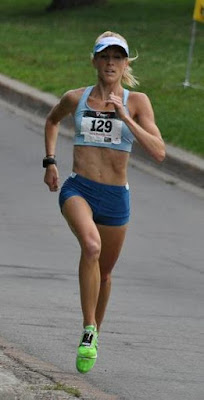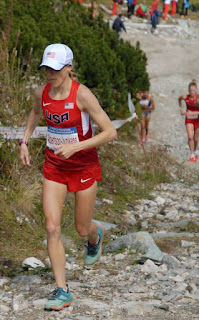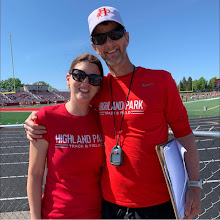 |
| Olympic Trials #2 Photo: Lisa Kresky-Griffin |
Well, if you follow the Minnesota running scene at all, this is very likely the interview you've been waiting for. Eric Loeffler, 41 of Minneapolis, has been on a tear lately. Late last year he qualified for his third Olympic Marathon Trials - the latest one as a Masters runner. That means in 2020, he'll make his way to Atlanta as a 43-year-young runner. Below he shares his struggles as a young runner, how he got serious, why he moved from North Dakota to Minnesota and much more.
I don’t know if
there’s any way to compare runners across entire years or not, but your 2017
season had to be one of the best ever amassed by a Minnesotan road racer. Let’s
start with a recap of the state age records; 1 mile in 4:23, 24:46 8K, 30:47
10k, 50:40 10 mile, and 1:08:15 half. That doesn’t include your “paltry”
non-state age record 15:03 5k. What the heck got into you last year?
Honestly, I didn’t realize all of those were state age
records until just now. Aging can have its benefits, I guess. Ha ha. I do find
it hard to believe it was one of the best seasons ever by a Minnesotan given
the rich history of Minnesota distance running, but a good way to start my
fifth decade I suppose. Looking back, I feel like 2017 was a fairly up and down
year. I was happy with how most of the year went, but definitely left a couple
races feeling like I underperformed a bit, specifically, the Boston Marathon
and Garry Bjorklund half marathon. On the flip side, I was thrilled with the
4:23 mile at the Hopkins Raspberry Run. Though I don’t have a lot of mile
racing to my credit in recent years, I believe that was the fastest I’ve run a
mile in ten years. And then to have a solid fall race season over some longer
distances was a nice way to close out the year.
After your Victory 10K someone said you were
running faster at 40 than at 20. I don’t know if
that’s true or not, but what
do you attribute your recent results to?
 |
| Celebrating becoming a Masters runner. Photo: Lisa Kresky-Griffin |
That is absolutely true. While, I had some success in my
younger years, I always felt like there was more there. For much of my 20s, I
would typically lose focus after a spring or fall race season and run somewhat
aimlessly until I put a race on the schedule for the following season. I was
always running during that time, but training was somewhat inconsistent and
probably not the best training anyway. Once I hit 30, I started getting a
little more focused, but it wasn’t until 2008 when I was in my early to mid-30s
that I really started seeing the cumulative benefit of a lifetime of miles. Up to
that point, I had really struggled to figure out the marathon. After failing
miserably to run well over 26.2, I distinctly remember wanting to give it one
“last” chance before putting the marathon to bed for good. At the time, I’m not
sure if I was more interested in never “racing” a marathon again or hopeful
that I would finally run one to my potential. Through some simple research on
marathon training methods, I changed up a couple things in training that I had
been missing and was hopeful it would lead to a better result. Fortunately, the
small tweaks worked and ran a significant PR. After that race, I felt that the
marathon was where I wanted to focus my efforts for the next several years.
A couple years later, I started working with a coach, Tom
Dooher, who at the time was coaching at Moorhead High School. I felt like I
needed to be more structured and perhaps feel a greater accountability to the
training. Full disclosure, I owe much of my success over the past several years
to Tom. Training under him certainly changed my running career, and I gained a
friend in the process. Initially, I basically just did whatever he told me to
do and followed all of his workouts as written. It was more volume than I had
ever run on a consistent basis and even more marathon-specific work. I started
noticing the fitness gains after only a few months working with Tom, and the
PRs started dropping at 5K, 10K, etc. over the next few years, even during
marathon buildups. He’s a super positive guy and when he would tell me I was
ready to race well, I believed him. About a year after we started working
together, I managed to qualify for my first Olympic Marathon Trials (2012). That
had been a long shot goal for a number of years, but actually achieving it
changed my mindset on what was possible and what I wanted to accomplish going
forward. Over the next couple years, we started to figure out what worked best
and which workouts gave me the most confidence going into race day. Without a
doubt, following a consistent, purposeful approach to training definitely
contributed to the successes I’ve had in recent years. Long story, short… I am
very grateful for the time Tom invested in me and for his friendship.
Oh yeah, I almost
forgot (not really) about your 2:17:34 at California International Marathon
(CIM), which, by the way, would have topped Olympian Steve Plasencia’s 2:19:06
state age record if you’d run it in Minnesota. That race qualified you for the
2020 Olympic Marathon Trials. Congrats! Was that your main goal for the race?
What about winning the USATF Masters title?
Thank you! CIM was certainly the highlight of the year,
and actually the past couple years. I hadn’t put together a marathon to my
liking since Grandma’s in 2015, so it felt really good to race something
comparable to prior marathons. I had a solid buildup over the summer and fall
and went into CIM feeling prepared to race well. What that meant exactly wasn’t
so clear. Running a qualifying mark for the 2020 Olympic Marathon Trials wasn’t
necessarily the primary goal for 2017, but I did feel that hitting the standard
was a possibility if everything aligned on race day. I really just wanted to
race well and would have been happy with a 2:20 or anything under that.
As for the masters title, it was definitely on my mind as
a goal, but when I’m out there I’m just racing and don’t give it much thought. That
is until it comes down to a kick with someone in their 20’s… that’s when my age
becomes very apparent in a hurry! Aging can have its drawbacks. Ha ha. And now I
wish I would have chosen a marathon in Minnesota last fall! Seriously though,
it is a humbling thing to be in the mentioned alongside the likes of Steve
Plasencia. Guys like him, and more recently Meb and several others running so
well into their 40s has had a big influence on me, personally.
How did it play
out? Obviously, being a championship race, you must have lots of people to run
with?
Being a U.S. Championship at CIM, the field was obviously
going to be very strong and very deep. That combined with perfect marathon
weather and large packs of runners sharing the common goal of running fast made
for a good day for many. CIM did not disappoint! I have been fortunate to be in
a number of races like CIM was this year where there are packs of 20-25 guys
going for the Olympic Trials mark. I can’t say I’ve ever had more fun racing
than in those situations. Maybe it’s because it doesn’t really feel like racing
until 20 miles, but more like a long run with friends. Everyone is out there
helping each other out… with pacing, sharing water bottles, encouraging words
to stay with the pack, etc. As the “old” guy and having run CIM a few times
before, I knew the course well and tried to offer anything I could to some of
the younger guys in the pack. Some of them were debut marathoners, some of them
first time qualifiers, many of them future qualifiers. I find it really fun
being a part of something like that.
Well, 2017 is
ancient history. We live in a “what have you done for me lately” world. What do
you have planned for 2018? Care to share any goals?
Ahh man, so much for riding off into the sunset! As for
2018, getting that 2020 Olympic Marathon Trials qualifier sort of forced me to
rethink plans a little for the next couple years. I wasn’t necessarily planning
to focus on the marathon this year or next, but feel like I need to stay
somewhat sharp at racing the longer stuff to be as ready as I can be for 2020. I
will be 43 years old by then, so getting to Atlanta in one piece will be goal #1.
But, to answer your question, my 2018 goals have somewhat evolved as the winter
continued to drag on and I’ve had a few setbacks along the way. Lame excuses
mostly, but I seem to grow less and less tolerant to winter every year. Anyway,
I plan to do some local races this spring and ultimately build up for a fall
marathon that has yet to be determined.
 | |
| Eric and the "female persuasion", Sara. Photo: Lisa Kresky-Griffin |
The state age records
are also littered with your name from when you were 36-38 years old and living
in North Dakota. You finally pulled up stakes and moved to Minnesota. What lead
to the move and how has the transition been?
I really enjoyed my time living in Fargo. It is a great
city. But, I did get to a point where I just felt like I needed a new challenge
and a change of scenery. Plus, as I mentioned, winter is not my favorite season
and Fargo winters are no treat, especially for a runner. So, I packed up and
moved south. Clearly my perception of “south” is a bit flawed, but the Twin
Cities has such a great running community. Anyone who lives here knows that,
and I certainly felt a connection to the Twin Cities having lived here in the
past and still having numerous friends here. Oh, and there may have been someone
of the female persuasion involved too.
Let’s back up a bit. How did you first get
involved with running? Did success come quickly for you?
That
is a story of how getting into running probably saved my life. When I was about
to start 7th grade, I had full intentions of playing football like
most of my friends. You know, the real tackle football variety with helmets and
pads and kids far bigger than I was. What could go wrong? About two weeks before football practice was
scheduled to start, the cross country coach at my school, Terry Harrington,
called me on the phone and asked me if I was coming out for cross country. To
this day, I don’t recall exactly how Coach Harrington convinced me to join the
XC team, but I agreed to show up the first day of practice. That first season
didn’t go so well. I distinctly remember walking in a few XC races. Keep in
mind XC races in junior high were only 2 miles, but walk breaks seemed like a
must at that time.
The
next spring I went out for 7th grade track, but quit after the
second day of practice to play golf. Something about free golf every day after
school appealed to me. By the next fall, I found myself back on the XC team. Only
this time, I actually ran a bit over the summer and ended up making our varsity
team by the end of my 8th grade season. A skinny, little dork
sporting a grossly oversized letter jacket was quite the look I’m sure, but I
was hooked! And for the record, I still enjoy playing golf to this day.
You qualified for the state cross country meet
twice, finishing as high as 20th your senior year. Where did you run
in college and what kind of success did you have there?
I
ran collegiately at North Dakota State University (NDSU) in Fargo. I had high
aspirations coming in as a freshman, but my collegiate career never really panned
out quite how I envisioned. Not sure exactly what it was, but I just didn’t put
it together consistently. I did manage to compete at the NCAA XC championships
three times, but didn’t race particularly well at any of them. And was never
close to making NCAAs in track. Still, the time at NDSU was a wonderful
experience. NDSU has a long history of successful track & field teams that
continues to this day, so it was awesome to be part of a program like that. I think
not accomplishing the goals I had set for myself during my college years definitely
fueled me to keep plugging away and prove to myself there was something more
there.
What are your PRs?
1
Mile – 4:18
5K –
14:33
8K –
24:24
10K
– 30:28 (30:05 split in half marathon)
15K
– 46:08
10
Mile – 49:07 (half marathon split)
Half
Marathon – 1:04:30
Marathon
– 2:16:48
Do you have a favorite race? Favorite distance?
It is really difficult to pick a single favorite race
because I like so many of them for different races. For marathons, New York
City and CIM are on top. Garry Bjorklund or Houston for half marathon, and the Brian
Kraft 5K.
What is your
fondest running memory?
There are many, but from a pure running perspective I
would say it’s a tie between qualifying for the Olympic Marathon Trials in 2012
and 2020. [Editor's note: Eric also ran the 2016 trials in Los Angeles, but dropped out on a very hot day.] Both were special for different reasons, but had a similar feeling… I
don’t know, maybe that is just because both occurred on the same course (CIM). But
when I look back, more important than any accomplishment are the countless
number of people I have met over the course of 30 years of running. It’s not
lost on me how fortunate I am to have been on this journey for as long as I
have.
What are your
strengths? Weaknesses?
Come on man, you know I can’t disclose that information
and give the competition the upper hand. It’s hard enough getting older!
If you could run
with any Minnesotan, past or present, who would it be?
Good question. I’ve had the opportunity to meet and run
with so many amazing people over the years.
I couldn’t pick just one from those that I know personally. But for
those I have not met, I would say Bob Kempainen. I remember following his
career during my high school years when he was one of the top American
marathoners.
Finally,
what do you know now that you wish you’d known when you first started running?
How awesome the journey would be! Although, now
that I write that I’m glad I didn’t know it in the beginning, it would have spoiled
the fun.













